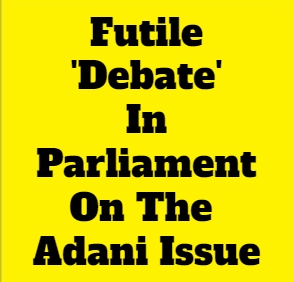

By Our Editorial Team
First publised on 2023-02-09 07:07:42
Parliament witnessed a spirited but futile debate on the Adani issue for the last couple of days. The opposition charge was led by Congress leader Rahul Gandhi, fresh from his Bharat Jodo Yatra, and he relied heavily on innuendos to claim that Prime Minister Modi and his government had helped Gautam Adani amass huge wealth in a short period of time by favouring him and his business entities. This, he said was done by putting in a good word about him to foreign governments to get him projects there or changing domestic rules to make Adani companies eligible to apply for projects which they could not have if the rules were not changed. The one charge that he emphatically made, that GVK was forced to sell the Mumbai airport to Adani, has already been rebutted by GVK vice-chairman G V Sanjay Reddy. Rahul Gandhi used Parliament to play to the gallery instead of raising questions about systemic discrepancies and other shortcomings of regulations and laws.
Prime Minister Modi, on the other hand and as expected, charged the opposition with coming up only with allegations and not constructive criticism or facts. He sought to dismiss the 10 years (2004-2014) of UPA governance as the 'lost decade' and said that the period after that has been 'India's decade'. He, too, spoke nothing about what he termed as allegations regarding the Adani group's proximity to his administration and instead tried to compare the UPA decade with his own government to show that while the former was steeped in corruption, the latter was taking India ahead through reforms and good governance.
Hence, the debate served little purpose other than raising the Adani issue in Parliament. The pressing issues raised by the Adani fiasco remain unanswered. The government has taken the stand that market and banking regulators in India are capable enough to address them. But charges of changing of rules to favour Adani companies, rigging of share prices, offshore transactions, accounting malpractices and high valuation are serious enough to warrant a probe by a joint parliamentary committee. The opposition parties, sadly, do not have the numbers and are not capable of forcing the government to agree to such a probe.











